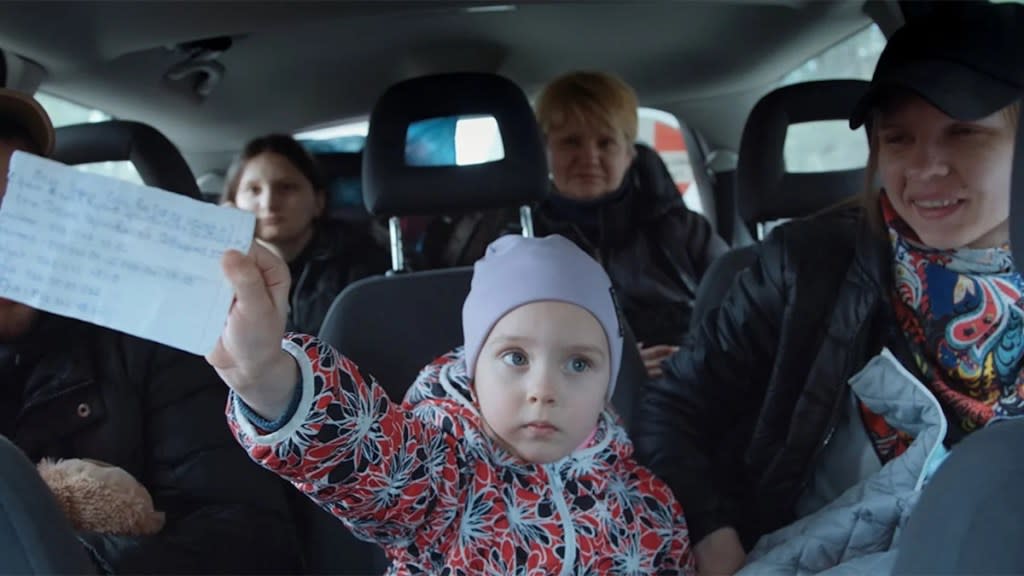‘In the Rearview’ Review: Road Trip Doc Puts a Face on Cost of War in Ukraine

Maciek Hamela is the director of the documentary “In the Rearview,” but directing was probably the least important job he had during the filming of his debut feature in Ukraine and Poland in 2022.
That’s because the film is a chronicle of countless journeys that took Ukrainians out of their war-torn country in the aftermath of the Russian invasion, ferrying individuals and families to Poland in search of safer places to live. For many of those journeys, Hamela himself served as the driver, with the film made up almost entirely of what happened inside the car during trips through the devastated landscape. He may have directed the movie, but there wouldn’t be a movie unless Hamela first got the refugees out of Ukraine.
“In the Rearview,” which played at the Toronto International Film Festival after premiering in Cannes’ ACID program, is a road movie that is simple in concept and devastating in execution. One group of refugees after another rides out of Ukraine and into Poland, talking about why they’re leaving and what they’ve left behind. Cameras in the front seat are pointed at the passengers. When one group gets out, another takes its place. And slowly, methodically, it adds up to a wrenching portrait of the human side of war – faces to remember rather than faceless statistics.
There’s no real attempt to give context, because all the context we need is within the confines of this car. Here’s a man who says, mournfully, “Everything we own, we’re leaving it. We set the dogs loose. What could we do?” Then a woman talking about the cow they had to leave behind, until an elderly man cautions her, “Stop talking about the cow, you’ll start crying again.”
Here’s a pregnant young woman who’s serving as a surrogate mother – but the agency shut down during the war and stopped answering her calls, so she’s got to get out rather than pursuing her dream to open a café. Then a group who talk matter-of-factly about being tortured by the Russians. “The first one is the worst,” says a man. “Then you get used to it.”
And above all, here are the children. A little girl who looks out the window and says, “Such beautiful buildings, not bombed at all.” Another girl who hasn’t spoken since a bomb blew the door off a room where she was standing. A five-year-old who’s permanently scared of airplanes, and who plays rock-paper-scissors but adds her own sign: a gun.
The cameras occasionally move outside when passengers are picked up or let off, and news sometimes comes through on the radio or from soldiers at checkpoints. (A common directive: You can’t keep going down this road, it’s been mined.) but for the most part, we are inside the car with the kind of people who, when they’re asked where they want to go in Poland, answer, “Doesn’t matter. Anywhere in Poland that is safe.”
The trips go through bucolic fields and countrysides, but also around bomb craters and through devastated cities. And the editing, especially in the first half of the film, is purposefully jumbled: It shifts from person to person, from one carload to another, from day to night with no attempt to introduce these people. We don’t get to officially meet them, but we do get to know them, passengers in a car that never stops except to pick up or drop off refugees and casualties.
By the second half of “In the Rearview,” the individual stories are allowed to play out at greater length, including a woman who is fleeing with her cat and a Congolese woman who needs an ambulance but can’t get one because nobody from the ministry has authorized transporting a foreigner. There’s nothing flashy about the way these stories are assembled or told, but the cumulative power becomes overwhelming.
And individual moments hit hard and resonate. “There’s no more boom-boom,” a father tells the girl who hasn’t spoken since the bomb fell on her house, and another child sitting nearby shrugs at the prospect of more bombing. “We’ll die,” she says casually. “That’s all.”
“In the Rearview” is a sales title at TIFF.
The post ‘In the Rearview’ Review: Road Trip Doc Puts a Face on Cost of War in Ukraine appeared first on TheWrap.

 Yahoo News
Yahoo News 
